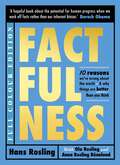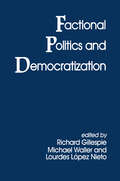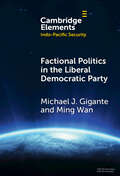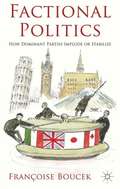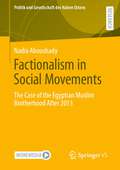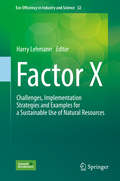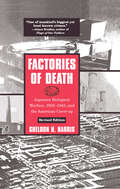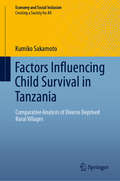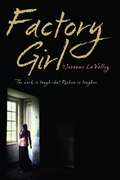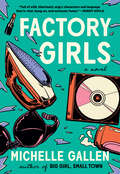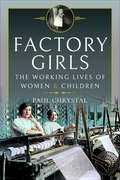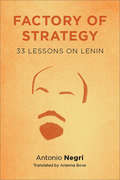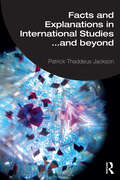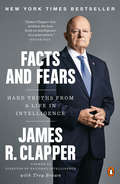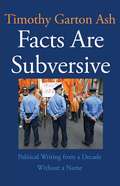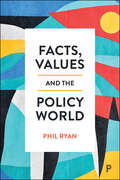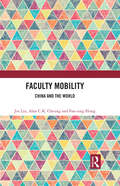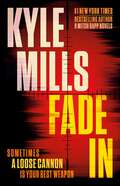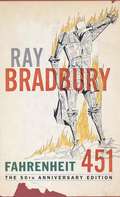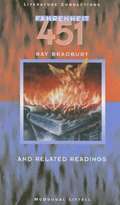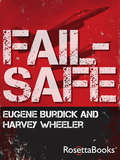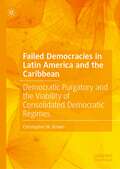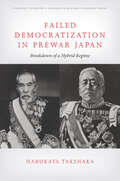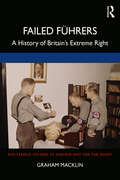- Table View
- List View
Factfulness Illustrated: Ten Reasons We're Wrong About the World - Why Things are Better than You Think
by Hans Rosling Ola Rosling Anna Rosling RönnlundThe international best-selling phenomenon loved by BARACK OBAMA and BILL GATES in a new and updated illustrated edition'A hopeful book about the potential for human progress when we work off facts rather than our inherent biases.' BARACK OBAMA'One of the most important books I've ever read - an indispensable guide to thinking clearly about the world.' BILL GATES*#1 Sunday Times bestseller * instant New York Times bestseller * Observer 'best brainy book of the decade' * #1 Wall Street Journal bestseller * Irish Times bestseller * Audio bestseller * Guardian bestseller * FACTFULNESS: the stress-reducing habit of only having opinions for which there are strong supporting facts.Things aren't as bad as we think. Fact.When asked simple questions about global trends - why the world's population is increasing; how many young women go to school; how many of us live in poverty - we systematically get the answers wrong. So wrong that a chimpanzee choosing answers at random will consistently outguess journalists, Nobel laureates, and investment bankers.In Factfulness, legendary statisticians Hans, Anna and Ola Rosling offer a radical new explanation of why this happens, and reveal the ten instincts that distort our perspective. It turns out that the world, for all its imperfections, is in a much better state than we might think. But when we let the bad news take on outsize proportions instead of embracing a worldview based on facts, we can lose our ability to focus on the things that threaten us most. Inspiring and revelatory, filled with lively anecdotes and moving stories, Factfulness is an urgent and essential book that will change the way you see the world.
Factional Politics and Democratization
by Richard Gillespie Michael Waller Lourdes López NietoThis book addresses the nature of factionalism in parties that are created or rebuilt after a period of dictatorship. It maintains that, while party leaders often view factions in negative terms as divisive, factional behaviour can also be constructive. The volume brings together detailed case studies from post-authoritarian Spain, Greece and Portugal, from Turkey (where factionalism has hampered democratization) and from the post-communist states in Eastern Europe.
Factional Politics in the Liberal Democratic Party: Explaining Change and Continuity in Japan's Economic Statecraft (Elements in Indo-Pacific Security)
by Ming Wan Michael J. GiganteWhat explains change and continuity in Japan's economic statecraft? This Element examines the interplay between factional dynamics in the Liberal Democratic Party (LDP) and Japan's foreign policy through two cases: Japan's unprecedented decision to impose severe sanctions on Russia following its 2022 Ukraine invasion, and its decades-long ASEAN strategy amid political uncertainty and great power competition. The authors find that factional balance or the outsized influence of a large faction facilitates abrupt political-economic shifts, sustained until a similar dynamic triggers correction. Unlike most systems, Japan's intra-party politics do not lead to full leadership turnover, enabling factions to influence policy while empowering non-leadership members to drive change. This dual role strengthens barriers to change, embedding political inertia. Using factional membership data from 1961 to 2024, they argue that factions are a more systematic unit of analysis than political entrepreneurs in understanding the relationship between Japan's domestic politics and foreign policy decisions.
Factional Politics: How Dominant Parties Implode or Stabilize
by Françoise BoucekDrawing on theories of neo-institutionalism to show how institutions shape dissident behaviour, Boucek develops new ways of measuring factionalism and explains its effects on office tenure. In each of the four cases - from Britain, Canada, Italy and Japan - intra-party dynamics are analyzed through times series and rational choice tools.
Factionalism in Social Movements: The Case of the Egyptian Muslim Brotherhood After 2013 (Politik und Gesellschaft des Nahen Ostens)
by Nadia AboushadyThis research unpacks the reasons of the Muslim Brotherhood’s factionalism post-2013 and defines the scope of disagreements within the group, by applying an interactionist approach to factionalism. This approach analyzes the interplay between the macro-, meso-, and micro- dimensions. The research re-constructs the narrative of Muslim Brotherhood's factionalism post-2013, and includes the implicit micro-structural dimensions of the factional process, thereby proposing a more comprehensive narrative to the conflict.
Factor X
by Harry LehmannFactor X: Re-source Designing the Recycling Society explores the role of recycling in efforts to achieve the sustainable world envisioned in the Federal Environment Ministry s Resource Efficiency Programme, known as ProgRess. The chapters build a roadmap to a Recycling Society in which the decoupling of resource consumption and economic growth is accomplished. "
Factories of Death: Japanese Biological Warfare, 1932-45 and the American Cover-Up
by Sheldon H. HarrisFactories of Death details the activities of the Japanese army scientists that conducted numerous horrifying experiments upon live human beings. It investigates who from the upper echelons of the Japanese military and political establishments knew of the experiments, also the question of whether or not Allied POWs were subjected to such tests, and the nature of the deal that was brokered with US authorities after the war. This new edition has been completely updated, and contains an entirely new chapter detailing the numerous revelations that have surfaced since the book's initial publication in 1994.
Factors Influencing Child Survival in Tanzania: Comparative Analysis of Diverse Deprived Rural Villages (Economy and Social Inclusion)
by Kumiko SakamotoThis book addresses the essential topic of child survival in Tanzania, especially focusing on the role of mutual assistance, which has received little attention to date. Further, it identifies a range of key factors for child survival by combining a literature review, regional data analysis, and case studies. These studies center on rural villages in high Under-5 mortality rate (U5MR) regions and assess their strengths and weaknesses regarding child survival. By focusing on deprived rural areas as of 2002 and evaluating the improvements in the 2012 census data, the book also highlights the potential held by rural semi -subsistence economies. An analysis of the focus villages indicates that children in food-sharing circles had better chances of survival. However, food sharing is not necessarily inclusive; a significant number of children have fallen out of such circles, especially in mainland villages. Furthermore, monetary support for children’s medicine has often failed to arrive in time. Lastly, the book argues that, in addition to direct factors such as access to health services, water and sanitation, food intake, and education, it is essential that children receive inclusive support at various levels: family, community, village, national, and international.
Factory Girl
by Josanne La Valley<p>In order to save her family’s farm, Roshen, sixteen, must leave her rural home to work in a factory in the south of China. There she finds arduous and degrading conditions and contempt for her minority (Uyghur) background. <p>Sustained by her bond with other Uyghur girls, Roshen is resolved to endure all to help her family and ultimately her people. A workplace survival story, this gritty, poignant account focuses on a courageous teen and illuminates the value—and cost—of freedom.</p>
Factory Girls
by Michelle GallenA funny, fierce, and unforgettable read about a young woman working a summer job in a shirt factory in Northern Ireland, while tensions rise both inside and outside the factory walls. Winner of the Comedy Women in Print 2022-23 Published Novel Award It&’s the summer of 1994, and all smart-mouthed Maeve Murray wants are good final exam results so she can earn her ticket out of the wee Northern Irish town she has grown up in during the Troubles. She hopes she will soon be in London studying journalism—away from her crowded home, the silence and sadness surrounding her sister&’s death, and most of all, away from the violence of her divided community. As a first step, Maeve&’s taken a job in a shirt factory working alongside Protestants with her best friends. But getting the right exam results is only part of Maeve&’s problem—she&’s got to survive a tit-for-tat paramilitary campaign, iron 100 shirts an hour all day every day, and deal with the attentions of Handy Andy Strawbridge, her slick and untrustworthy English boss. Then, as the British loyalist marching season raises tensions among the Catholic and Protestant workforce, Maeve realizes something is going on behind the scenes at the factory. What seems to be a great opportunity to earn money turns out to be a crucible in which Maeve faces the test of a lifetime. Seeking justice for herself and her fellow workers may just be Maeve&’s one-way ticket out of town. Bitingly hilarious, clear-eyed, and steeped in the vernacular of its time and place, Factory Girls tackles questions of wealth and power, religion and nationalism, and how young women maintain hope for themselves and the future during divided, violent times. Shortlisted for the 2023 Royal Society of Literature Encore Award (for second novels) and the Christopher Ewart-Biggs Memorial Prize
Factory Girls: The Working Lives of Women & Children
by Paul ChrystalEver since there have been factories women and children have, more often than not, worked in those factories. What is perhaps less well known is that women also worked underground in coal mines and overground scaling the inside of chimneys. Young children were also put to work in factories and coalmines; they were deployed inside chimneys, often half-starved so that they could shin up ever narrower flues. This book charts the unhappy but aspirational story of women and children at work through the Industrial Revolution to the beginning of the 20th century. Without women there would have been no pre-industrial cottage industries, without women the Industrial Revolution would not have been nearly as industrial and nowhere near as revolutionary. Many women, and children, were obliged to take up work in the mills and factories – long hours, dangerous, often toxic conditions, monotony, bullying, abuse and miserly pay were the usual hallmarks of a day’s work - before they headed homeward to their other job: keeping home and family together. This long overdue and much needed book also covers the social reformers, the role of feminism and activism and the various Factory Acts and trade unionism. We examine how women and children suffered chronic occupational diseases and disabling industrial injuries - life changing and life shortening – and often a one way ticket to the workhouse. The book concludes with a survey of the art, literature and the music which formed the soundtrack for the factory girl and the climbing boys.
Factory of Strategy
by Antonio Negri Arianna BoveFactory of Strategy is the last of Antonio Negri's major political works to be translated into English. Rigorous and accessible, it is both a systematic inquiry into the development of Lenin's thought and an encapsulation of a critical shift in Negri's theoretical trajectory.Lenin is the only prominent politician of the modern era to seriously question the "withering away" and "extinction" of the state, and like Marx, he recognized the link between capitalism and modern sovereignty and the need to destroy capitalism and reconfigure the state. Negri refrains from portraying Lenin as a ferocious dictator enforcing the poor's reappropriation of wealth, nor does he depict him as a mere military tool of a vanguard opposed to the ancien régime. Negri instead champions Leninism's ability to adapt to different working-class compositions in Russia, China, Latin America, and elsewhere. He argues that Lenin developed a new political figure in and beyond modernity and an effective organization capable of absorbing different historical conditions. Negri ultimately urges readers to recognize the universal application of Leninism today and its potential to institutionally -- not anarchically -- dismantle centralized power.
Factory of Strategy: Thirty-Three Lessons on Lenin (Insurrections: Critical Studies in Religion, Politics, and Culture)
by Antonio NegriFactory of Strategy is the last of Antonio Negri's major political works to be translated into English. Rigorous and accessible, it is both a systematic inquiry into the development of Lenin's thought and an encapsulation of a critical shift in Negri's theoretical trajectory.Lenin is the only prominent politician of the modern era to seriously question the "withering away" and "extinction" of the state, and like Marx, he recognized the link between capitalism and modern sovereignty and the need to destroy capitalism and reconfigure the state. Negri refrains from portraying Lenin as a ferocious dictator enforcing the proletariat's reappropriation of wealth, nor does he depict him as a mere military tool of a vanguard opposed to the Ancien Régime. Negri instead champions Leninism's ability to adapt to different working-class configurations in Russia, China, Latin America, and elsewhere. He argues that Lenin developed a new political figuration in and beyond modernity and an effective organization capable of absorbing different historical conditions. He ultimately urges readers to recognize the universal application of Leninism today and its potential to institutionally—not anarchically—dismantle centralized power.
Facts and Explanations in International Studies...and beyond
by Patrick Thaddeus JacksonThe politicizing of facts and factual claims has led some to abandon all talk of a meaningful distinction between a fact and a strongly held political commitment. This book argues that what we need, instead, are better accounts of facts and their relationship to explanation—ones that take seriously the dependence of facts on communities of practice and on consensus procedures of measurement, but do not abandon the epistemic distinctiveness of facts.Bringing clarity and order to the discussion by disclosing both key commonalities and significant differences between the ways we talk about facts and explanations, Patrick Thaddeus Jackson argues that although intrinsically more contestable than facts, social-scientific explanations can nonetheless be related to them in ways that allow researchers to evaluate explanations based on whether and to what extent they accord with the relevant facts in each situation. Ardently defending a pragmatist account of knowledge that has no patience with either “alternative facts” or “anything goes” relativism, the author develops a set of concepts that enables tricky philosophical problems to be dissolved. After examining facts, causal explanations, and interpretive explanations, the book culminates in an account of the priority of interpretation in the evaluation of any explanation—and any seemingly factual claim.Defining the terms of the debate and grounding better conversations about the issues, this book will appeal to all scholars interested in the philosophy and methodology of the social sciences, international studies, international relations, security studies, and anyone teaching or studying research methods.
Facts and Fears: Hard Truths from a Life in Intelligence
by James R. Clapper Trey BrownThe former Director of National Intelligence's candid and compelling account of the intelligence community's successes--and failures--in facing some of the greatest threats to America <P><P>When he stepped down in January 2017 as the fourth United States director of national intelligence, James Clapper had been President Obama's senior intelligence adviser for six and a half years, longer than his three predecessors combined. He led the U.S. intelligence community through a period that included the raid on Osama bin Laden, the Benghazi attack, the leaks of Edward Snowden, and Russia's influence operation during the 2016 U.S. election campaign. <P>In Facts and Fears, Clapper traces his career through the growing threat of cyberattacks, his relationships with presidents and Congress, and the truth about Russia's role in the presidential election. He describes, in the wake of Snowden and WikiLeaks, his efforts to make intelligence more transparent and to push back against the suspicion that Americans' private lives are subject to surveillance. <P>Finally, it was living through Russian interference in the 2016 presidential election and seeing how the foundations of American democracy were--and continue to be--undermined by a foreign power that led him to break with his instincts honed through more than five decades in the intelligence profession to share his inside experience. <P>Clapper considers such controversial questions as, Is intelligence ethical? Is it moral to intercept communications or to photograph closed societies from orbit? What are the limits of what we should be allowed to do? What protections should we give to the private citizens of the world, not to mention our fellow Americans? Are there times when intelligence officers can lose credibility as unbiased reporters of hard truths by inserting themselves into policy decisions? <P>Facts and Fears offers a privileged look inside the U.S. intelligence community and, with the frankness and professionalism for which James Clapper is known, addresses some of the most difficult challenges in our nation's history. <P><b>A New York Times Bestseller</b>
Facts are Subversive
by Timothy Garton Ash'During times of universal deceit', wrote George Orwell, 'telling the truth becomes a revolutionary act. ' For more than thirty years, Timothy Garton Ash has traveled among truth tellers and political charlatans to record, with scalpel-sharp precision, what he has found. This book confirms his reputation as our foremost historian of the present. Facts are Subversive contains Garton Ash's eye-witness accounts of the fate of countries, including Serbia, Poland and Ukraine, making the transition from dictatorship to democracy, and his dispatches from places such as Egypt, Burma and Iran, where that transformation has yet to take place. A recurring theme, of the book and the decade, is freedom and its discontents. An encounter with the drug gangs of Sao Paulo raises disturbing questions about liberal democracy; his examination of immigration and Islam in Europe challenges the clichés of multiculturalism. Often humorous mini-essays, selected from his columns in the Guardian, rub shoulders with in-depth treatments of subjects including Günter Grass, George Orwell and Isaiah Berlin. Facts are Subversive also includes Garton Ash's most recent reportage on the election of Barack Obama and its implications for the world.
Facts, Values and the Policy World
by Phil RyanMany policy analysts – and citizens interested in public issues – believe that rigorous thought should be uncontaminated by values, which are merely subjective. Policy analysis, however, is about what is worth doing and therefore inherently values based. This accessible book reveals the damage that this contradiction inflicts on policy analysis and society. It also demonstrates the real-world failings of various influential alternatives to the ‘value-free’ ideal. By showing that values are amenable to critical analysis, this book provides a solid foundation for a comprehensive approach that reimagines the scope and role of policy analysis in contemporary society.
Faculty Mobility: China and the World
by Jin Liu Alan C.K. Cheung Fan-sing HungAdopting curriculum vitae (CV) analysis method, this book collects CVs of university faculty from 109 universities of "The Double First Class University Plan" in China, and systematically analyses the mobility pattern of faculty in China for the first time. Examining the overall mobility frequency of Chinese faculty and its growing rate, the authors predict that after the epidemic, with the growing number of returned overseas talents, there may be a third wave of faculty mobility. They demonstrate that East Asia, the United States and Europe are the main channels for the inward talent mobility to China, and there are significant differences in China’s faculty mobility among different regions, disciplines and genders, which deserves further investigation. Furthermore, they argue the influencing factors of faculty mobility between China and foreign countries are highly different too. Scholars and students of Chinese higher education, international and comparative education may find this book helpful, and benefit from the analysis framework of Push and Pull Theory as long as CV analysis method.
Fade In: A Thriller
by Kyle MillsWhen an ex-Navy SEAL ends up injured and imprisoned, a shadowy ring of power brokers offers him the only way out—through a high-stakes military mission. A "searing, cerebral, high-stakes knockout" (Prairies Book Review) international political espionage thriller from #1 New York Times bestselling author Kyle Mills. "Wall to wall action. Great book," as recommended by bestselling thriller author Brad Thor on Today. "Fade is a badass operator whom even a coma can&’t stop. . . . Plenty of action, plenty of fun." —Kirkus ReviewsWhen ex-navy SEAL Salam &“Fade&” al-Fayed steps in front of a sniper&’s bullet, he assumes that he&’s reached the end of the road—his death wish has finally been answered. Instead, he wakes in a hospital. As one of the deadliest operatives in U.S. history, he&’s now incapable of even standing without assistance. Alone and wanted by authorities, he&’s destined to spend the rest of his life lying in a prison infirmary. So when a shadowy organization offers him a new identity and next-generation medical care, he has no choice but to agree. Nothing&’s free, though. After a grueling rehabilitation, he&’s drafted into an elite paramilitary unit. But who&’s in charge? When a dire threat—a highly contagious pathogen—explodes out of China, his question is quickly answered: A select group of the world&’s wealthiest and most powerful people has decided that governments are no longer capable of controlling the chaos erupting around the globe. It&’s a power grab by billionaires who&’ve decided that it&’s their time to rule. With panic rising, the leaders of both democracies and dictatorships prove equally willing to destroy anything and anyone to save themselves. Forced into action before he&’s fully ready, Fade finds himself at the sharp end of a mission to stop a menace unlike any he's faced before. If he fails, the consequences will be unimaginable. But what if he succeeds? No one elected the people he&’s working for. And God sure as hell didn&’t ordain them. Has he signed on to save the human race . . . or to help quietly enslave it? Fade In tackles the complex threats of international espionage, power imbalances, and global terrorism–and introduces a character destined to take his place among legends like Vince Flynn&’s Mitch Rapp, Robert Ludlum&’s Jason Bourne, Lee Child&’s Jack Reacher, and Daniel Silva&’s Gabriel Allon. "The prose snaps and hums. . . Fade In is a gripping, violent, and often heartbreaking book. It&’s for readers who like their thrillers with a sharp philosophical bite." —Literary Titan Kyle Mills is the author of nine New York Times bestselling Vince Flynn novels featuring Mitch Rapp.
Fahrenheit 451
by Ray BradburyMontage never questions the destruction and ruin his actions produce, returning each day to his bland life and wife, Mildred, who spends all day with her television “family.” But when he meets an eccentric young neighbour, Clarissa, who introduces him to a past where people didn’t live in fear and to a present where one sees the world through the ideas in books instead of the mindless chatter of television, Montage begins to question everything he has ever known.
Fahrenheit 451 and Related Readings
by Ray BradburyFahrenheit 451 visualizes a terrifying future in which the job of firemen is to burn books. The Related Readings include The Portable Phonograph, short story by Walter Van Tilburg Clark; "You Have Insulted Me", letter by Kurt Vonnegut; Burning a Book, poem by William Stafford; A Summer's Reading, short story by Bernard Malamud; The Paters on Public Library, memoir by Judith Ortiz Cofer; The Phoenix, short story by Sylvia Townsend Warner.
Fail-Safe
by Eugene Burdick Harvey WheelerFrom the New York Times–bestselling authors, this &“chilling and engrossing&” nuclear-showdown thriller packs &“a multi-megaton wallop&” (Chicago Tribune). Originally published during the Cuban Missile Crisis, this suspenseful novel takes off as a group of American bombers—armed with a deadly payload of nuclear weapons—heads towards Moscow, their motives unknown. Suddenly, a nuclear apocalypse looms closer than it ever has, and the lives of millions depend on the high-stakes diplomacy of leaders on both sides of the divide. The basis for the classic 1964 movie starring Henry Fonda, this two-million-copy bestseller is not only a terrifying thriller, but a fascinating social commentary on Cold War politics and a look at how, in a world poised on the brink, accidents and mistakes can have catastrophic consequences. Exploring the thin line between peace and global destruction that characterized this turbulent era, it is as timely as ever—&“gripping, exciting and almost unbearably fascinating&” (Los Angeles Times). &“Excruciatingly tense.&” —The Wall Street Journal
Failed Democracies in Latin America and the Caribbean: Democratic Purgatory and the Viability of Consolidated Democratic Regimes
by Christopher M. BrownThis book addresses the breakdown of failed democratic systems in Latin America and the Caribbean. The scope of this investigation is a study of political systems of Venezuela, Colombia, and Nicaragua. The implications of the present research on democratic purgatory have real-world applications not only for the above countries but also for those political systems that are currently transitioning and/or consolidating their democracies as well.
Failed Democratization in Prewar Japan: Breakdown of a Hybrid Regime
by Harukata TakenakaFailed Democratization in Prewar Japan presents a compelling case study on change in political regimes through its exploration of Japan's transition to democracy. Within a broad-ranging examination of Japan's "semi-democratic" political system from 1918 to 1932, when political parties tended to dominate the government, the book analyzes in detail why this system collapsed in 1932 and discusses the implications of the failure. By reference to comparable cases#151;prewar Argentina, prewar Germany, postwar Brazil, and 1980s Thailand#151;Harukata Takenaka reveals that the factors responsible for the breakdown of the Taisho democracy in Japan replicated those that precipitated the collapse of democracy in Europe, Latin America, and elsewhere in Asia. While most literature on these transitions focuses on successful cases, Takenaka explores democratic failure to answer questions about how and why political parties and their leaders can behave in ways that undermine the democratic institutions that serve as the basis for their formal authority.
Failed Führers: A History of Britain’s Extreme Right (Routledge Studies in Fascism and the Far Right)
by Graham MacklinThis book provides a comprehensive history of the ideas and ideologues associated with the racial fascist tradition in Britain. It charts the evolution of the British extreme right from its post-war genesis after 1918 to its present-day incarnations, and details the ideological and strategic evolution of British fascism through the prism of its principal leaders and the movements with which they were associated. Taking a collective biographical approach, the book focuses on the political careers of six principal ideologues and leaders, Arnold Leese (1878–1956); Sir Oswald Mosley (1896–1980); A.K. Chesterton (1899–1973); Colin Jordan (1923–2009); John Tyndall (1934–2005); and Nick Griffin (1959–), in order to study the evolution of the racial ideology of British fascism, from overtly biological conceptions of ‘white supremacy’ through ‘racial nationalism’ and latterly to ‘cultural’ arguments regarding ‘ethno-nationalism’. Drawing on extensive archival research and often obscure primary texts and propaganda as well as the official records of the British government and its security services, this is the definitive historical account of Britain’s extreme right and will be essential reading for all students and scholars of race relations, extremism and fascism.
